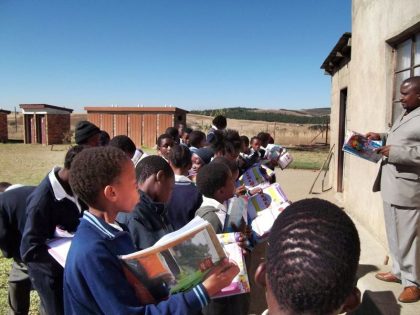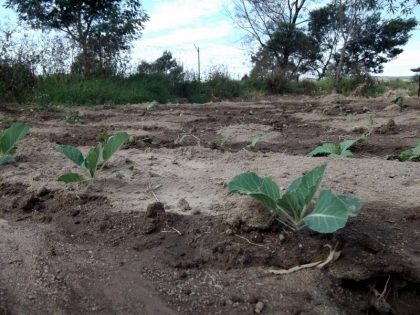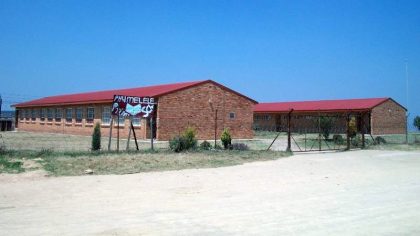 Location
Location
Sincobile, Eastern Mpumalanga, South Africa
Community Description
Sincobile is a small South African village of about 1,000 people, located in eastern Mpumalanga near the border of Swaziland. The dominant language is Siswati. The village lies in the foothills of the mountains to the east, and is surrounded by commercial pine tree plantations.
Most families in Sincobile live in varying degrees of poverty. Traditional homes, those constructed of mud and thatched grass roofs, greatly outnumber homes constructed with more modern techniques. Very few families have televisions or radios, and even fewer have cars. It is very common to see people riding horses along the dirt road.
 Most of the people of Sincobile who do have jobs work for the tree farming companies, and nearly all families practice farming to some extent.
Most of the people of Sincobile who do have jobs work for the tree farming companies, and nearly all families practice farming to some extent.
Agriculture is very important to the community. Sincobile is in the Highveld region of South Africa. This is a blessing and a curse, in that precipitation is plentiful, but the soil is predominantly composed of clay, and therefore contains high quantities of acid. During the spring and summer months it rains nearly every day. Precipitation levels drop off steeply during fall and winter months, however, and because the municipal water supply is not dependable, farming can become very difficult during these seasons.
Phumelele Primary School has begun a permagardening program. The goal is to produce part of the food for the school meal plan, and also to teach students gardening methods that can save water and produce crops without the need for expensive fertilizers and pesticides. Constant access to water is needed to continue the program year round. Due to the undependable municipal water system, the school is often forced to buy water deliveries for the cisterns.
 Project Description
Project Description
This project is to build a rainwater catchment and storage system at the Phumelele Primary School.
Gutters will be installed along the roof of the school. The water will flow into two water cisterns at the end of the school near the garden.
The water collected in the cisterns will be used for hand washing and gardening. Municipal water for drinking will be collected in a separate cistern when it is running. Since it will not be needed for hygiene, sanitation, and gardening, the potable water will last much longer.
In addition, a water awareness program will be created at the school. Short classes in water conservation will be given for older students and a puppet show will teach younger students. Once the new system is in place, signs will be placed on all the cisterns with simple iconic images to remind students which cisterns are for what purpose.
The project is being carried out under the direction of the School Governing Body and Parents Committee.
Project funds will be used for the purchase of equipment and materials.
The work of installing the gutters and cisterns will be completed by the Peace Corps Volunteer and the school general worker.
Project Impact
200 students will benefit from the project.
Peace Corps Volunteer Directing Project
Alan Toth
Comments
This project will provide a more consistent and reliable supply of water and eliminate the cost of purchasing water for the school.
Dollar Amount of Project
$555.00
Donations Collected to Date
$555.00
Dollar Amount Needed
$0.00 – This project has been fully funded, through the generosity of The Soneva SLOW LIFE Trust as a part of their Clean Water Projects initiative.
We encourage others to continue to donate using the Donate button below, and we will notify Peace Corps Volunteer Alan Toth of your donation. Additional funds will be used to fund the next project by Alan and/or those other PCVs in the country of service.
This project has been finished. To read about the conclusion of the project, CLICK HERE.